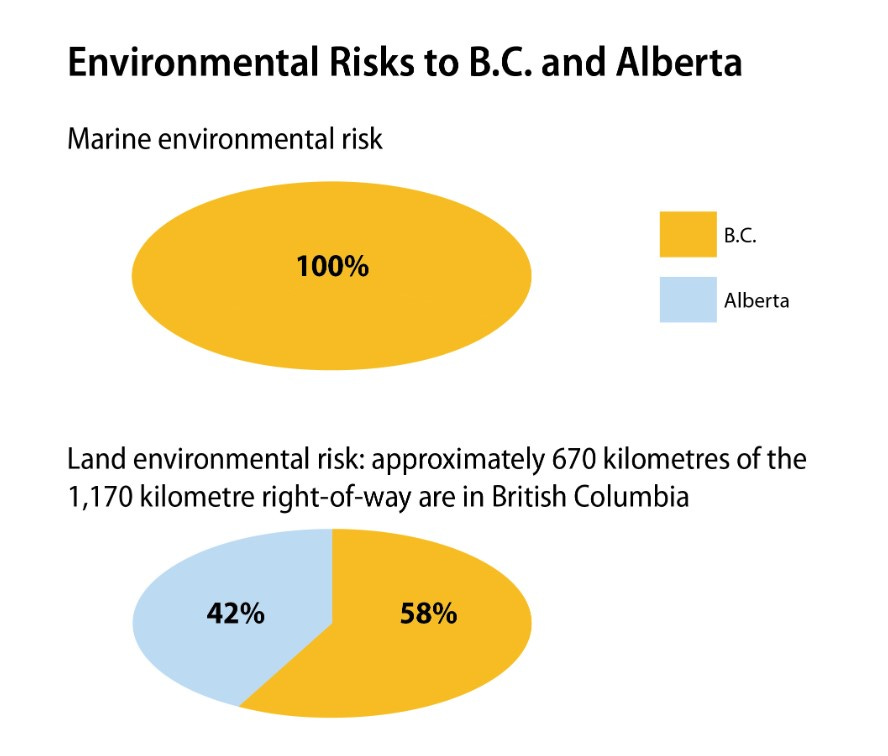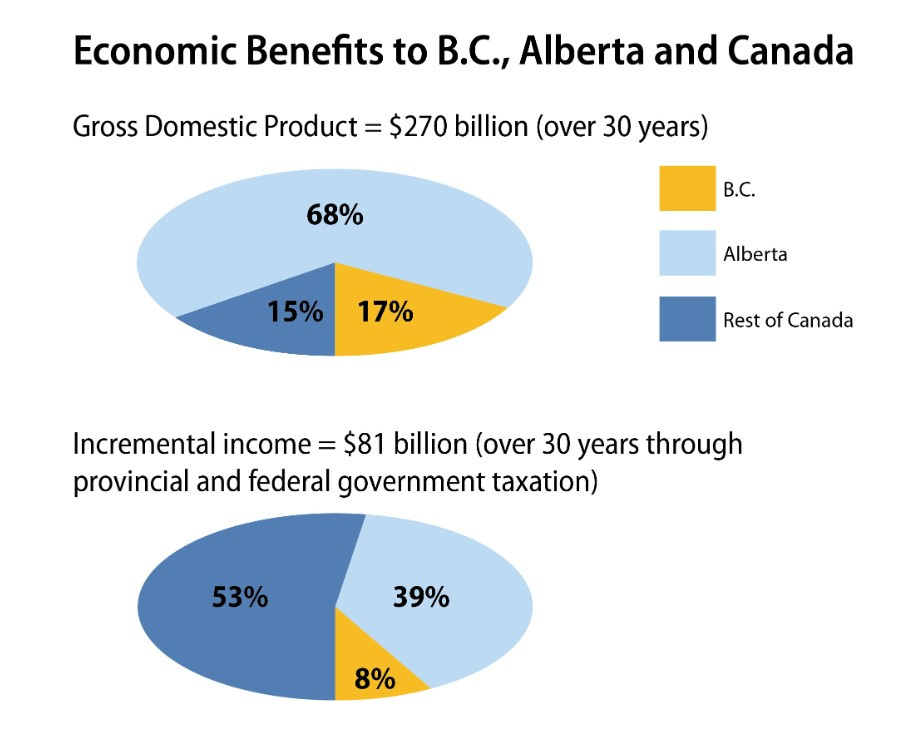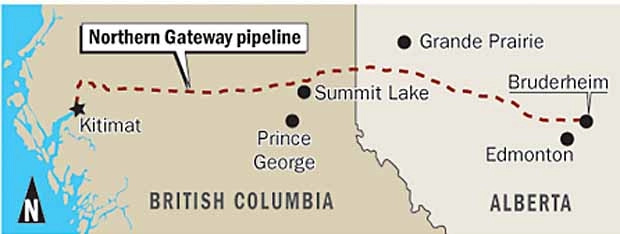BC remains firmly opposed to a northern pipeline
British Columbia isn’t interested in having oil pipelines, such as a revived Northern Gateway, traversing the province from Alberta to tidewater, deputy premier Nikki Sharma told reporters prior to the start of the First Ministers conference in Saskatoon, Saskatchewan on Monday.
Sharma, attending the conference while Premier David Eby was on a trade mission to Japan, said that the province is in favour of projects that “are bringing our clean energy and our critical minerals strategy to the table.”
With respect to the possibility of reviving the Northern Gateway Pipelines or a similar project, which Alberta Premier Danielle Smith has said she’s interested in seeing happen, Sharma said that with no proponent for that particular project, BC is going to focus on shovel-ready projects that “we can bring forward and we know will have a really solid impact on the economy and will help us work together with our neighbours.”
Province’s history of opposition to oil pipelines
A decade ago, Enbridge had received federal approval for the Northern Gateway Pipelines project, a 1,177 km-long $5-billion twin pipeline project which would carry crude oil to Kitimat, BC from Bruderheim, Alberta and natural gas condensate from Kitimat to Bruderheim. The 657-km BC section would pass through northeastern BC between Tumbler Ridge and Summit Lake, continuing just south of Fort St. James to a purpose-built $7.9 billion marine terminal in Kitimat.
Initially announced in 2006, the proposed project proceeded slowly towards approval over the next eight years. A Joint Review Panel Agreement was issued in December 2009, outlining the terms of reference for a regulatory and environmental review of the project. In January 2011, the panel requested more information on design and risk assessment of the project, before the federal government finally accepted the project proposal in June 2014, subject to 209 conditions.
“Our answer at this point is, we want to focus on shovel-ready things. There’s no proponent at this time; there’s no project that is really there to look at.”
BC Deputy Premier Nikki Sharma
Enbridge originally expected the project to be complete by 2015.
In 2012, Christy Clark’s BC Liberal government was in favour of natural gas pipelines, but Clark wasn’t interested in endorsing Northern Gateway unless British Columbia got more than eight percent of the revenue. If the project went ahead, BC would have assumed 100 percent of the marine risks, and 58 percent of the land-based risks of the pipeline, risks the government, environmentalists and First Nations were uncomfortable with.
Clark wanted to renegotiate a fairer share of benefits from the proposed project and listed five requirements for approval, including completing the environmental review process; deploying world-leading marine and land oil-spill response, prevention and recovery; addressing aboriginal and treaty rights, ensuring First Nations had the opportunities and information necessary to benefit from a heavy-oil project; and ensure BC received a fair share of economic and fiscal benefits that reflects the level of risk borne by the province, taxpayers and the environment.
The BC NDP wasn’t in favour of the project either, and then-leader Adrian Dix, now the province’s Energy Minister, wanted to pull out of the federal government’s pipeline review process and create a made-in-BC environmental assessment review process.
Murray Rankin, who led the NDP legal team against the Enbridge project, said in a 2012 press conference that the new process would “ensure that BC’s economic, social and environmental interests are fully addressed, that BC’s powers and responsibilities are properly exercised and that First Nation’s interests are recognized in the new process.”
At the same press conference, Dix declared that within 30 days of winning the 2013 election – which the NDP lost – he would “serve the federal government with 30 days notice to terminate the 2010 deal in which the Liberals signed away BC’s interests.”
Economic benefits of Northern Gateway
Smith has long advocated for pipelines from Alberta to tidewater, either on BC’s coast or more recently Hudson’s Bay at Churchill, Manitoba. Such projects would be good for Alberta and the Canadian economy according to Smith.
If the Northern Gateway, Energy East and Keystone XL pipelines had been built, Smith says Alberta would be shipping 2.5 billion more barrels per day for a total of $55 billion in GDP, $17 billion of which would go to the Alberta government in tax revenue. That product would have been shipped to markets other than the United States, at world prices, not the discounted price Canada gets from the US.
While the economy of northern British Columbia with its abundance of petroleum resources is more like that of Alberta than southern BC, and such a pipeline project could prove beneficial to the local economy, the terms of the project ten years ago didn’t do much for the province.
Northern Gateway was projected to add $270 billion to Canada’s gross domestic product (GDP) over 30 years, create 62,694 person-years of employment during construction and 1,146 permanent jobs when construction was complete. It was also projected to add $81 billion of incremental income through taxation over the same 30-year period.
Of those revenues, 17 percent of the GDP and just eight percent of the tax revenues would go to British Columbia. The federal government would enjoy 58 percent of the tax revenue.
However, Smith believes that despite BC’s reluctance, there is an appetite to at least talk about building pipelines to get product to market. But unless the federal government addresses the “nine terrible policies that have damaged investor confidence, we’re not going to get the proponents coming forward with major investments,” Smith said.
This lack of investor confidence in Canadian fossil fuel project development applies to all Western provinces whose natural resource sectors bring in significant revenues.
Smith said that having an energy corridor to BC that includes a bitumen pipeline would be a good first step.
“Understanding that we won’t get a serious proponent from the private sector unless we address those underlying conditions, it’s the reason the federal government had to step in the first time when there were no proponents willing to take on Trans Mountain.”
Sharma stands firm
Sharma said while she and Alberta Premier Danielle Smith were at the conference to advocate for the interests of their respective provinces, there would be differences of opinion, but they would focus on areas where they could “find alignment.”
British Columbia, Sharma said is “team Canada all the way.”
“We are here at the table to make sure we can find alignment all the way and find those projects that we know will unlock economic activity, bring people together and do things we all want to do at this time.”
As for a bitumen pipeline, Sharma says there’s already one in BC, the Trans Mountain pipeline which is not yet operating at capacity. The projects BC is interested in bringing forward are clean energy, critical minerals and economic corridors.
CBC’s David Cochrane asked Sharma if BC would support fast-track status for an energy corridor that goes to either Kitimat or Prince Rupert.
Sharma replied that at the recent Western Premiers conference there was a high-level agreement for economic corridors, and the potential it would unlock.
“From BC’s perspective, we have ports, we have requests for better electrical transmission, rail lines, those kinds of corridors that we think the national unity that we think comes from trade corridors through the country is something we would certainly support,” she said.
“You’ve heard the premier say this, we have a difference of opinion about whether or not a bitumen pipeline should go, particularly in the northern part of the province. We’re open to a discussion today at the table about what kind of an economic corridor is needed and how we could approach that discussion, but that’s our stance at this point.”
When asked point-blank by another reporter if that means BC’s answer to pipelines is “no”, Sharma said “Our answer at this point is, we want to focus on shovel-ready things. There’s no proponent at this time; there’s no project that is really there to look at.
“At this stage, I think that what BC’s position is, is let’s focus on projects that are ready, that we can focus that we know with strong investment and alignment we bring very quick action,” she said.






